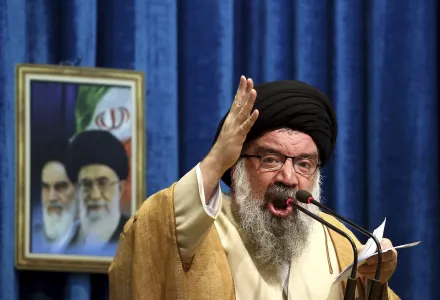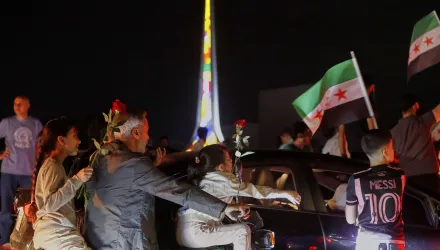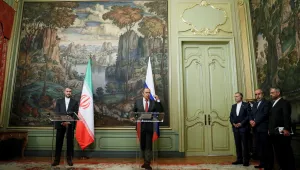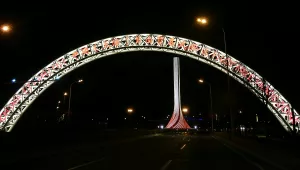
State Sponsorship of Terrorism Will Continue
On December 28, 2017, protests broke out in Mashhad, a city in northeastern Iran. By the time the rest of the world was celebrating the advent of a new year, major demonstrations had spread to cities and towns across the country. By January 2, over 20 people had been killed amid the unrest. As Iranian officials scrambled to respond to the largest demonstrations since the 2009 Green Movement—a wave of protests over the fraudulent reelection of hardliner Mahmoud Ahmadinejad to the presidency—U.S. President Donald Trump took to Twitter to express his own thoughts on what was taking place.
According to Trump, the Iranian people are sick of the regime’s sponsorship of terrorism, which chips away at their wealth. As the president put it, “Many reports of peaceful protests by Iranian citizens fed up with regime’s corruption & its squandering of the nation’s wealth to fund terrorism abroad. Iranian govt should respect their people’s rights, including right to express themselves. The world is watching!” This talking point has since dominated U.S. officials’ and lawmakers’ remarks on the developments in Iran. As White House Press Secretary Sarah Huckabee Sanders put it, Trump would “certainly like to see [Iran] stop being a state sponsor of terror. I think that’s something the whole world would like to see.”
However much the United States and its allies would like the protests to yield a dramatic shift in Iranian policy, the reality is that the Iranian government is unlikely to change course. Indeed, the administration and observers must adjust their hopes and expectations of what the protesters can achieve.
Iran’s ties to terrorist groups and other non-state actors in its neighborhood are not only a matter of ideology, or even economics. To be sure, in the early days of the Islamic Republic, the revolutionaries sought to establish relations with various Shiite groups and to challenge what they viewed as corrupt regimes akin to the one they had just overthrown. But today, such relationships are more about security than revolutionary dogma.
Among the security benefits Iran receives from its ties to non-state actors are deterrence, intelligence sharing, assistance with counterintelligence operations, counterterrorism, and power projection. For example, the Iranian government makes use of its comprehensive relationship with Hezbollah to gain intelligence and to deter Israel and the United States. Its more modest ties to the Houthis in Yemen afford Iran the ability to poke its Saudi rival in the eye at a low cost; its tactical cooperation with al Qaeda in the 1990s and 2000s helped prevent Iran from becoming a target of the group; and its support of Taliban groups allows it to push back the Islamic State (ISIS) offshoot known as the Islamic State in the Khorasan Province (ISKP) in Afghanistan.
To be sure, Iran’s ties to these groups come at a cost. Reputational, moral, and economic effects stymie the country’s full integration into the world community. The remaining sanctions on Iran for its support of terrorist groups, combined with the money it spends on that support, make much-needed economic recovery more difficult. As the country seeks to reap the fruits of the nuclear deal it concluded with the world powers it must tackle this obstacle alongside those stemming from its internal challenges, including the corruption and mismanagement Iranians are protesting today, and those outside Tehran’s control, such as the uncertainty created by Trump’s Iran policy.
But in its cost–benefit calculations, Iran sees the security benefits of its ties to various non-state actors as exceeding their economic costs. That is why decades of sanctions and isolation have not led to a reduction in Iran’s support of the groups in its neighborhood. In fact, the collapse of central authorities, the rise of adversarial terrorist groups such as ISIS and ISKP, and U.S. chest-thumping in the region all deepen the belief among government officials that the country must be able to work with non-state actors in order to promote its interests and meet its security needs. The protesters are unlikely to fundamentally change this worldview.
Iran sees the security benefits of its ties to various non-state actors as exceeding their economic costs.
Indeed, although some protesters have challenged Iran’s foreign policy in recent days, most have focused on economic matters and those political issues impacting their economic wellbeing, such as corruption, lack of transparency, and mismanagement. The government’s response is likely to be tailored accordingly. International observers may be quick to point out that some of the slogans now heard on the streets of Iran pertain to foreign policy matters, but they are nothing new. In 2009, Iranians were already chanting, “Neither Gaza, nor Lebanon, I give my life to Iran.” The slogans certainly express Iranians’ exasperation with many of their leadership’s policies, including those beyond their country’s borders. But foreign policy considerations are typically low on their list of priorities, when compared to issues affecting their daily lives front and center.
Iranian support for terrorist groups often appears on the United States’ list of grievances with the Islamic Republic. After all, U.S. troops have long grappled with those actors in key theaters such as Afghanistan and Iraq. Iranians, too, have long questioned their country’s relations with these groups. But in the end, the Iranian political and security establishments see the price their country pays for these relationships as being less than the benefits conferred. Hence, the protesters likely won’t alter the regime’s policies towards non-state actors. As Washington assesses what to do next regarding the protests in Iran, it should adjust its expectations of the extent of the change they can bring about.
Tabatabai, Ariane. “Why the Protests Won't Change Iran's Foreign Policy.” Foreign Affairs, January 5, 2018





